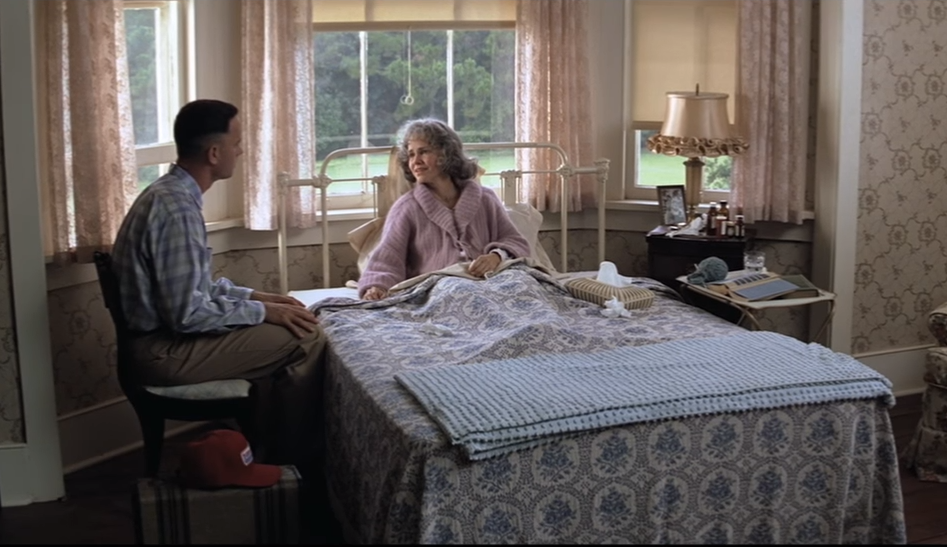How To Talk About Dying
Forrest Gump is my all-time favorite movie.
It’s an emotional rollercoaster film that won the Best Picture Oscar in 1994. A coming-of-age story about the serendipitous life journey of a sweet, loving IQ-challenged Alabama man/boy living through the 1960s, 70s, and 80s. Like the rest of us, Forrest experiences family losses, death, and grief along life’s way.
Early in the movie, Forrest enlists in the Army, finding himself in the heat of the Vietnam War. After enduring four months of rain, one day the showers stop and bullets and bombs start raining down. Over and over, Forrest runs back into the enemy-infested jungle retrieving his wounded comrades, bringing them to safety.
During his last rescue, he finds that his best friend Bubba has been mortally wounded. His dying buddy shares his last words, “I wanna go home.” Forrest then says something many of us have awkwardly felt when facing someone near the end of life, “If I had known this was the last time Bubba and me was gonna talk, I’d have thought of something better to say.” He concludes the scene observing, “Bubba was my best good friend, and even I know that ain’t something you can find just around the corner.”
Shakespeare astutely observed, “There’s no good time to bring bad news.”
It’s Hard to Talk About Dying
Our unfortunate default when faced with our mortality or that of our loved ones is to become like the three monkeys – Hear No Evil, See No Evil, and Speak No Evil. Avoiding talk about death and dying has serious consequences. The dying person can feel isolated, angry, and denied the right to complete unfinished business whether it be financial, emotional, spiritual, or relational. Those left behind may experience complicated grief due to guilt wondering what they could have done, should have done, or not done.
Unresolved issues and emotions become bottled up, pushed down, and waiting to explode when unexpectedly triggered.
When a serious or terminally ill person wants to talk about their decline or impending death, we need to encourage them to be open and honest by putting aside our own discomfort. Be present with them in the moment. Focus on their needs and allow them to set the pace of the conversation. Don’t try to change or avoid the subject or minimize the seriousness of what they’re facing. Resist your urge to “fix” the situation or impose your own agenda and values on them.
The Benefits of Talking About Dying
The benefits of talking about dying are many. It allows everyone involved to participate in the process. It empowers the dying to their right to know the truth, to complete unfinished business, to share their journey with others, and not to be alone physically, emotionally, or spiritually.
Hospice and palliative care professionals typically begin by exploring what the patient is thinking and feeling and LISTENING to the answers given to these six open-ended “safe questions”:
- What concerns do you have about your health and/or illness?
- How are things going with you and your family?
- As you think about your illness, what are the best and worst things that can happen?
- What has been the most difficult part of your illness?
- What are your hopes (expectations, fears) for your life with this disease?
- As you think about the future, what matters to you most?
In a survey* of hundreds of dying patients, they were asked, “What do you want most as you approach the end of your life?” The #1 response from 89% of respondents was this: they want someone to LISTEN TO THEM! Not fix them, cure them, or appease them. JUST LISTEN!
Dying Is A Part of Life

Later in the movie as Forrest and Lieutenant Dan are eating dinner on their shrimp boat, Forrest gets a call that his Momma is sick. Fully clothed, Forrest dives off the side of the boat and runs home to find his ailing mother lying in bed. She greets him with a broad welcoming smile, “Hi Forrest!” He asks, “What’s the matter Momma?” In a matter-of-fact tone she replies, “I’m dying Forrest, come in and sit down.”
“Why you dying Momma?” he inquired. “It’s my time. It’s just my time. Oh, now you don’t be afraid sweetheart. Death is just a part of life. Something we’re all destined to do…”
Forrest reflects, “Momma always had a way of explaining things so I could understand them.”
In a closing scene, Forrest is standing over his wife Jenny’s grave and having a conversation with her as though she was present. He shared with her, “Momma always said, ‘Dying was a part of life.’ I sure wish it wasn’t.”
Allowing loved ones to talk about death is one of the greatest “uncomfortable gifts” we can bestow on them. It’s a hard conversation to have. “I sure wish it wasn’t.” But it’s needed!
*survey done in 2014 by Transcend Strategy Group